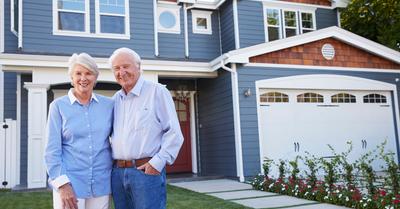Table of Contents
The Housing for Older Persons Act
The Housing for Older Persons Act, or HOPA, was enacted in 1995 to amend the Fair Housing Act. HOPA removed the requirement that low income housing for age 55 and older have facilities and services specifically designed for elderly people.
For a community to meet the minimum age requirement of age 62, the facility or housing community must be only occupied by those that are at least 62. The requirements for communities that accept anyone over the age of 55 are a little different.
According to HOPA, to qualify as senior housing, the facility or community must have at least 80 percent of the units occupied by someone who is at least 55 years old. Only one person per unit has to meet this age requirement. Additionally, the manager or owner of the facility has to present policies that show that they intend to use the housing for people who are 55 years of age or older. These policies can be marketing or advertisements or rules or regulations that directly target seniors.
To prove you meet the age requirement, you will have to provide documentation. This may include your birth certificate, drivers license, military ID, or immigration card. If you do not have this documentation, you may be able to use an application affidavit or self certification on a lease to satisfy the age requirement documentation.
A community may, however, require occupants to be older than the minimum age provided by HOPA. The housing community or facility may require that 80 percent or more of the units have at least one person over the age of 60, 80 percent occupied only by those over 55 (instead of just one occupant per unit over 55), or 100 of the units occupied by people over 55 years of age.The community will have to comply with any state and local laws that may apply because they could prohibit this type of age discrimination.
Additional Age and Income Requirements
In addition to the minimum age requirements, it is important to know the maximum income requirements for a senior to qualify for low income housing and any other age limitations or requirements. The National Council of Aging defines citizens as low income seniors if they have less than $30,000 annual income and are over the age of 60. Additionally, the Department of Housing and Urban Development has separate income requirements.
The HUD income requirements are based on the average income for the county in which the senior resides or hopes to reside. Generally, there are two levels to qualify for low-income housing specifically for seniors. To qualify as low income, your income has to be less than 80 percent of the average income in the county. To qualify as very low income, your income has to be less than 50 percent of the average income in the county.
Programs
There are a few different programs that you may be able to take advantage of as a low income senior. The programs include the Low Income Housing Tax Credit program, Section 202, Section 8, and public housing. Each of these programs has a different set of qualifications for age and income.
Tax Credits
The Low Income Housing Tax Credit Program (LIHTC) uses investors and developers to provide housing for seniors. They can develop or rehab properties to receive tax credits in return. There are different qualifications depending on the age and income of the person who is applying. Every community sets their own requirements as far as age and income eligibility is concerned.
Usually, the minimum age requirements dictated by the individual communities will be similar to the HOPA guidelines for senior housing. This means that the minimum age will usually be either 55 years or 62 years. In addition, the residents will have to meet the income requirements. The LIHTC program states that the income, whether fixed or limited, cannot exceed 60 percent of the county or area’s median income. Some areas have different limitations that can go as high as 80 percent of the area’s average income or as low as 30 percent of the area’s average income.
Section 202
This option is only available for seniors who have limited mobility. The program can help with necessary services including transportation, cooking, and cleaning. The minimum age requirement for Section 202 housing is 62 years old. In addition, you will have to have very low income which is 50 percent of the average income in the county or area.
Section 8
This program is managed at the state level even though it is run at the federal level by the Department of Housing and Urban Development. This program is for low-income families and those with disabilities in addition to providing housing options to low income seniors.
Section 8 is also known as the Housing Choice Voucher Program. The housing that Section 8 uses is privately owned, but the federal government can help people pay for rent and utilities by providing them with housing vouchers. Usually, you will have to pay 30 percent of the monthly adjusted gross income. The housing voucher will pay for most, or all, of the difference. In addition, you can even use the Section 8 housing vouchers to buy a home.
The income limit to qualify for Section 8 housing vouchers if 50 percent or less of the average income in the county or area. Usually, if you qualify you will be placed on a waiting list. Sometimes these waiting lists are 1 or 2 years long.
Public Housing
Apartment buildings and high-rises make up what is defined as public housing. Local county or city agencies regulate and oversee the public housing complexes. The units are subsidized and designed specifically for low income families or even for low income senior citizens. The qualifications depend on the local agency and the apartment or high-rise. However, you will have to pay 30 percent of your income towards utilities and rent.
Finding Low Income Senior Housing
Sometimes it can be pretty hard to locate senior housing. It is a good idea to start by checking out the website for the Department of Housing and Urban Development (HUD). They have tons of resources. However, there are additional places that you may want to check as well.
The Future of Housing Initiative was created by the AARP and they provide more affordable housing facilities and communities to retired seniors. You may also want to contact your local HUD field office or your local housing authority. Check out this spreadsheet for HUD field office contact information.
Your local housing authority will be able to offer you the specifics on income averages and affordability in your area. If you live in an area that has multiple counties, it is a good idea to check each one’s housing authority.
A main concern is the inability to find available housing options that are designed for seniors and that are also affordable. If you do not find options in your specific city or county, it may not hurt to broaden your search to include neighboring cities. Some regions and cities have much more affordable housing than others.
If you find multiple options for affordable senior housing, you need to determine which one suits your needs the best. Take the proximity to church, family, parks, grocery stores, and other frequented locations into consideration. Also take the negatives into account. If there is one that is not near a place you regularly visit, take that housing community out of the equation.
Recent Articles


















